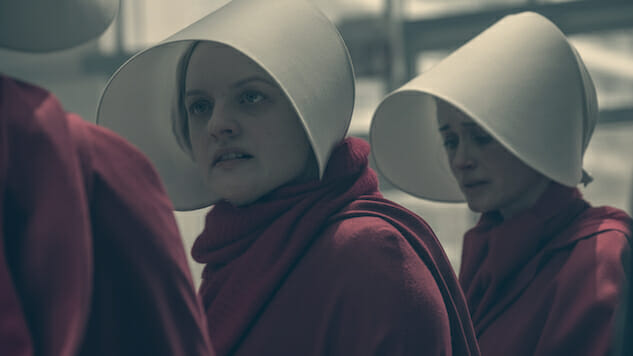The Handmaid’s Tale Names Names in the Chillingly Beautiful “After”
(Episode 2.07)
Photo: George Kraychyk/Hulu
So many names. Our names mark us as individuals and also imply something about where we came from. We might choose new ones, but the names we are given when we’re born are part of what defines us as unique beings. That’s why they are among the many things Handmaids aren’t allowed to have.
At the end of “First Blood,” the last thing you see is Ofglen II (Tattiawna Jones) clicking the detonator on a bomb inside the spankin’ new Rachel and Leah Center. At the end of this week’s episode there’s another potentially explosive click.
But first, can we just take a moment to ogle the unbelievably beautiful photography and production design as the Handmaids walk through the snow to the mass funeral of the Handmaids who died in the explosion? Cloaked in charcoal and veiled in scarlet, they are now utterly indistinguishable from one another, unless you’re Offred (Elisabeth Moss) and visibly pregnant, chanting in a call-and-response as Aunt Lydia (Ann Dowd) says a prayer: “We will remember them.” Does Aunt Lydia mean it when she says “Girls, I wish I could give you a world without violence?” Does this sadistic tool of the system actually have a beating human heart? Is she in her own way actually trying to save lives? Is she simply trying to keep herself in a power position? Is she merely the most soulless hypocrite ever? The more screen time this character gets, the more I begin to wonder: How did she become Aunt Lydia? Who was she before Gilead?
“In their names, dear Lord: We will remember them.”
It’s just so freaking rife. Long past the ending of the narrative in Margaret Atwood’s novel, this show continues to channel her esthetic so perfectly, the narrative moving like a figure skater over the icy surface of an unfathomably deep lake. Atwood consulted on the production of the second season—I hope she loves this adaptation half as much as I do.
It’s not looking good for anyone associated with the resistance. The Eyes have hanged bodies everywhere. Fred Waterford (Joseph Fiennes) is injured but alive. Commander Price (Robert Curtis Brown) is not, which is bad news for Nick (Max Minghella). Actually, it’s bad news for everyone, because he’s replaced by Commander Cushing (Greg Bryk), who immediately establishes martial law, and establishes himself as a good deal more vicious than his predecessor.
-

-

-

-

-

-

-

-

-

-

-

-

-

-

-

-

-

-

-

-

-

-

-

-

-

-

-

-

-

-

-

-

-

-

-

-

-

-

-

-








































